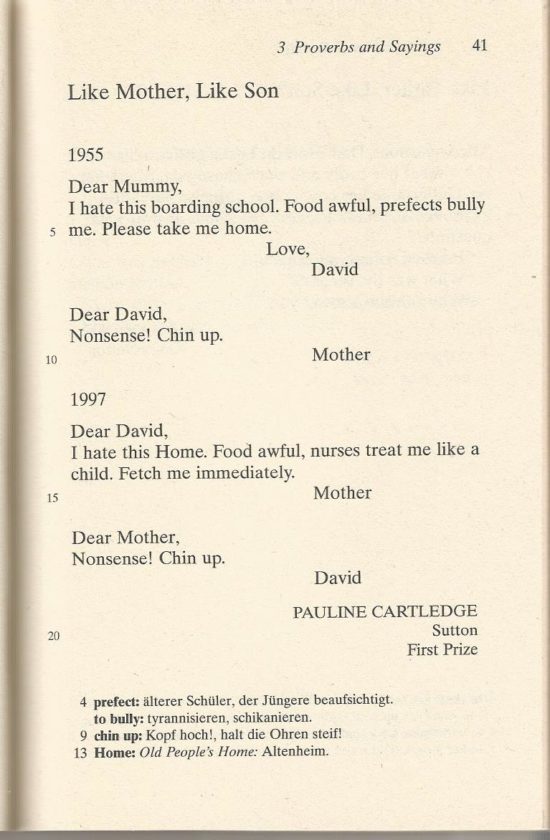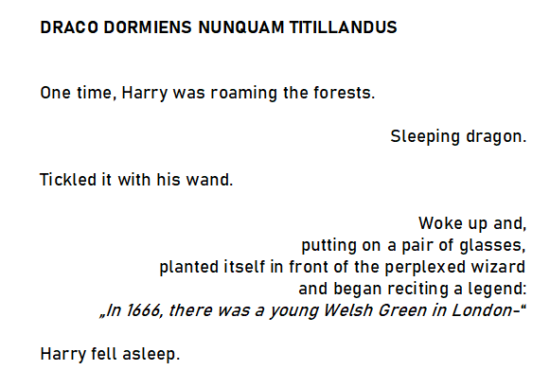Afraid of your English getting rusty? No need to worry! While there are certainly more obstacles around at the moment with interaction reduced to a minimum due to social distancing, we hope to provide you with some ideas & resources to stay motivated.
Here is what we are doing:
In today’s recommendation, I want to introduce you to the literary genre called „mini-sagas“. As mentioned in the clip above, I rediscovered this little Reclam anthology on my book shelf and, while I was paging through it, the Muse inspired me and I decided to give it a shot. So, in case you feel inspired to get creative yourself, let’s have a look at mini-sagas in closer detail together.
A mini-biography of a mini-story called „mini-saga“
| 1982 | Brian Aldiss, well-known British science fiction and short story author had been searching for a relaxing and brief, alternative writing activity and created the mini-saga |
| the Telegraph Sunday Magazine invited the people in the UK to write mini-sagas themselves; prizes were awarded by a jury in two categories : „Adult Winners“ and „Under-Eighteen Winners“; 32000 mini-sagas were born | |
| 1985 | 2nd competition by the Telegraph in collaboration with Radio 4 and the BBC; almost 50000 mini-sagas were submitted; a first anthology containing the best texts of the previous two competitions was published |
| 1988 | 3rd competition |
| 1997 | 4th competition; from now on an entrance fee of £5 was due; 7000 mini-sagas entered |
| 1999 | 5th competition |
| 2001 | 6th and last competition for the time being |
What makes a story a mini-saga?
Let’s start with the form of a mini-saga and with what is probably the key characteristic of it: a mini-saga may contain neither 49, nor 51, but exactly 50 words. Contractions are counted as one word and the strict rules show some flexibility when it comes to counting composita with a hyphen as one or two words. Despite its challenging brevity, a mini-saga should tell a complete, coherent and meaningful story with all the necessary parts to it: beginning, middle and end. Just like its literary brothers, sisters and cousins, a mini-saga requires a proper title that may consist of up to 15 words. If you feel like picking up a pencil or a writing programme of your choice, this is all you need to know to become the world’s most famous mini-saga author.
Oh you’re still here? Well, then you might want to learn even more about mini-sagas. Fantastic! Let’s continue.
What does a mini-saga tell and how?
We already know that a mini-saga tells a full story with beginning, middle and end. Since it works within a compressed space, beginning and end can only be described or mentioned briefly in a few words. Thus, we only get to see something like a snapshot of our characters‘ lived realities. The reader gets thrown into the scene right away and needs to concentrate on the very instant narrated in the mini-saga. The genre’s brevity does not leave much room for details and is at times compelled to reduce so much, that the reader cannot help but to fill the gaps from context. The „before“ and „after“ of the mini-saga lies with the interpretation of the reader. The „post-reading“-phase is often initiated by a punchline, twist or surprise ending.
This reduction to the essential makes that word classes containing additional information hardly appear in a mini-saga as well. In one of the mini-saga anthologies, you can read the following statement: „With a limitation fo fifty words, you shouldn’t really find any adjectives. And if you put an adverb in, it is usually because you have chosen the wrong verb“. Elliptical structures are also a very popular choice to save words. Stylistic and rhetorical devices on the other hand are gladly used to spice things up a bit and level out the shortage of words.
Despite its restrictions in form, the writer’s freedom in terms of content are endless. You can find mini-sagas on all kind of different and diverse topics. You can let your creativity run wild.
To give you an idea about how mini-sagas look , I am going to give two examples from the book published by Reclam that I mentioned in the video above: „Mini-Sagas. An Anthology of Fifty-Word Short Stories“ (my edition is from 2007).


And of course, I do not want to withold my own attempt from you! As you can see here, the shape or layout of your mini-saga can also support you in conveying information that you would have had to put into words otherwise.

Although the genre of mini-sagas has its origins in the Anglo-Saxon world, I have also experimented with writing one in French. If you are interested and want to have a look at it, go visit the corresponding article on our associated blog Perspectives Francophones.
So, now, I have shared with you a short summary of what I have learned about mini-sagas and I hope that I could give you everything you need to know in case you will get inspired by the Muse. To all those of you who will be working as an English teacher or language teacher in general, let me finish the article by sharing a link with you from the Cambridge Educational Resources for schools. Mini-sagas can be a great opportunity and tool for language learning at all levels and maybe you want to try it out with your future learners yourselves!
Is there anything you would like to share concerning the current situation? Do you have learning tips or just want to share your thoughts on this blog? Do not hesitate to contact us!



